
In a nationally televised address, President Obama called on Congress last night to take quick action and pass an overhaul of the nation’s healthcare system. Obama defended proposals for a government-run public health insurance plan as part of healthcare reform but suggested that he would accept a bill that did not include a public option. We speak with Rep. Raul Grijalva (D-AZ), co-chair of the Congressional Progressive Caucus. “We’re going to fight for it down to the very last day,” Rep. Grijalva says of the public option. “It’s got to be part of [the bill]. If it’s not, we are just showering money upon money upon the same system and the same industry that got us into the mess we’re in right now.” [includes rush transcript]
Transcript
JUAN GONZALEZ: In a nationally televised address, President Obama called on Congress last night to take quick action and pass an overhaul of the nation’s healthcare system. Obama outlined a plan to cut healthcare costs, improve care, regulate insurers, and expand coverage to more than 46 million uninsured Americans.
In an attempt to reach out to Republican lawmakers, Obama backed a Bush administration initiative to launch pilot projects aimed at reducing medical malpractice lawsuits. He also renewed his dismissal of single-payer healthcare, which he said would constitute too radical an overhaul. Meanwhile he defended proposals for a government-run public health insurance plan, but he suggested that he would accept a bill that did not include a public option.
PRESIDENT BARACK OBAMA: It’s worth noting that a strong majority of Americans still favor a public insurance option of the sort I propose tonight. But its impact shouldn’t be exaggerated by the left or the right or the media. It is only one part of my plan and shouldn’t be used as a handy excuse for the usual Washington ideological battles.
To my progressive friends, I would remind you that for decades the driving idea behind reform has been to end insurance company abuses and make coverage available for those without it. The public option — the public option is only a means to that end, and we should remain open to other ideas that accomplish our ultimate goal.
And to my Republican friends, I say that rather than making wild claims about a government takeover of healthcare, we should work together to address any legitimate concerns you may have. For example — for example, some have suggested that the public option go into effect only in those markets where insurance companies are not providing affordable policies. Others have proposed a co-op or another nonprofit entity to administer the plan. These are all constructive ideas worth exploring.
But I will not back down on the basic principle that if Americans can’t find affordable coverage, we will provide you with a choice. And — and I will make sure that no government bureaucrat or insurance company bureaucrat gets between you and the care that you need.
AMY GOODMAN: To talk more about President Obama’s address, we’re joined by Democratic Congress member Raul Grijalva, joining us on the phone from Capitol Hill, co-chair of the Congressional Progressive Caucus. He has co-authored a letter sent to President Obama saying if the public option is not included in the legislation, he won’t sign on.
Congress member Grijalva, welcome. What was your response to the speech?
REP. RAUL GRIJALVA: Well, that it was not a — it was generally a muted response in this sense, that it was encouraging — one of the things that we were concerned of is that we wouldn’t have any discussion about the public role, public plan, the public component to this healthcare reform. He did talk about it. The specificity that many of us have been advocating for, a strong plan, a good provider network, no triggers, that wasn’t part of the discussion, so that continues to be the struggle that we face here in Congress with not just ourselves, but with some of the leadership and others.
So, the fact that he mentioned the public plan, talked about the importance of it in holding private insurance companies accountable, that was good. And we live another — for another couple of weeks to make sure that we continue to advocate for what we think is important in that public option in the health reform. And without any significant public component, it is not going to be the reform that the President wants, and it’s not going to be — it’s not going to satisfy the expectations of the base of voters that are right now feeling somewhat disheartened that we’re not moving more aggressively to get his public plan done and done right.
JUAN GONZALEZ: But Congressman Grijalva, while he did defend the public option, he also left the door open to the — if people could come up with better ideas to accomplish the same end of lowering healthcare costs and covering other Americans, that he was open to it.
REP. RAUL GRIJALVA: Yeah, and we’ve said to leadership, these are some basic principles that need to be part of a public option. I don’t care what you call it. You could expand Medicare and enroll more people and lower the age requirement, open the eligibility. You can call it whatever you want. But the basic role that government has in holding private industry, private insurance accountable, cost containment and a publicly run choice for the American people has to be part of the plan and a good idea.
You know, like, we’ve been working at — we’ve been hearing about consensus and bipartisanship now for almost six months. And I’ve come to the conclusion that we’re not looking for middle ground as much as the opposition wants to delay. And, you know, they even — they first said that they wanted co-ops; now they’re opposed to co-ops. They first said that they thought that all we needed to do was expand Medicare; now they’re opposed to that expansion. So I think sometimes leadership and our president, in an effort to be conciliatory, we make too many concessions. And that’s where we find ourselves right now, in a situation where we’re fighting to keep a public plan that I feel, early on, we should have said this is part of it, and we would be defending something as opposed to trying to keep it in.
AMY GOODMAN: Congressman Grijalva, you come from Arizona, right near the border in the Tucson area. The point where President Obama talked about, don’t worry, the public option, a public plan, or any plans he has, would not include supporting illegal immigrants, Joe Wilson of South Carolina, the Republican, shouted out, “You lie!” You’re his colleague. Who is Congress member Wilson? And your response to that and also to the whole issue of immigrants?
REP. RAUL GRIJALVA: Well, the response is that that is Bush league. It is consistent with some of the irrationality that many of us saw at our town halls. Mr. Wilson is a back-bencher in this Congress, and all he does is rail against immigrants and rail against the whole healthcare reform. He’s irrelevant in the discussion, because he’s a no vote, doesn’t work on consensus. But he does represent the ugly face of this debate. And unfortunately, he took center stage the other day.
And one of the things that is not well with this health reform plan is that legal permanent residents are required to wait five years before they can receive any health benefit, even though they are legal. And we are arguing with the framers of the legislation, as well as the administration, that you’re making people illegal twice. You’ve asked them to go through the process, they legalized their status, they’re permanent legal residents, but yet there’s a penalty attached that you can’t get the benefit for five years. We find that to be double jeopardy.
JUAN GONZALEZ: And this is supported by many of your Democratic colleagues?
REP. RAUL GRIJALVA: Yeah. Yeah, that’s — you know, between immigration and health reform, those are the prickly issues that make some of my colleagues run for cover.
AMY GOODMAN: Congress member Grijalva, I also want to ask you about Senate Finance Committee Chair Max Baucus and his close ties to the healthcare industry. Yesterday, the White House Press Secretary Robert Gibbs said Baucus had distributed his healthcare plan to lobbyists on K Street prior to sharing the plan with other members of the committee.
Meanwhile, the watchdog website LittleSis.org has revealed Senator Baucus’s chief health adviser, Elizabeth Fowler, is a former executive for the insurance giant WellPoint. Fowler has been called the “chief operating officer” of the healthcare reform process. Baucus’s previous chief health adviser, Michelle Easton, now lobbies for WellPoint.
LittleSis.org also reports that another Senate staffer working on Baucus’s healthcare bill, Cathy Koch, is a former lobbyist for health insurance and pharmaceutical interests, including an insurance industry front group. Koch worked as the director of global government affairs at the drug company Amgen until early 2007. Before that, she worked at Ernst & Young, where she lobbied on behalf of a number of large insurance and pharmaceutical companies, including Aetna, Blue Cross, Eli Lilly and Pfizer.
What is your response, considering how central Max Baucus is to determining what Congress will come up with?
REP. RAUL GRIJALVA: I think the product that has come out from his committee and himself, I really believe that it has no legitimacy in this debate. It’s an insider product. It’s there to protect the industry. It is not there to try to look for that middle ground. He is key in holding up deliberations, has been key in trying to work on a consensus, but everything you see in his legislation had to be approved by the industry before it became part of the plan. So I don’t think it’s legitimate. I think we’re struggling with real issues in some of the other pieces of legislation from the House and even from the Health Committee. And that’s where the focus of the attention should be. I consider Senator Baucus’s proposal to be essentially an insider trader move to protect an industry and really doesn’t have validity at all, both political validity or content validity.
JUAN GONZALEZ: Yet, Congressman, press reports yesterday were suggesting that Democratic congressional leaders will attempt to have the Senate vote first on a healthcare bill, in essence to put pressure on the Progressive Caucus and the left of the Democratic Party —-
REP. RAUL GRIJALVA: Yeah.
JUAN GONZALEZ: —- to basically — it’s on you whether healthcare reform passes or not, any kind of healthcare reform passes.
REP. RAUL GRIJALVA: Yeah, you can kind of — you can kind of see the winds heading in that direction, where members of the Progressive Caucus, even though the Blue Dogs, twenty-three of them — twenty-three of them have already announced that they will not vote for anything, and so they’ve already canceled their votes and said, “We’re opposed to any reform package.” Even though that happens, and it’s publicly stated, I think the winds are going to shift, and the progressive members of Congress are going to be seen as the obstructionists. They’re going to try to be labeled at that. And I’ve said over and over, both to — we have told the administration and our leadership for almost — consistently for a year what we felt were the guiding principles to a public plan. We’ve been consistent. We haven’t backed off.
And, you know, this political line in the sand that we have drawn is not a gimmick. We feel very strongly about it. We believe that it’s not only good public policy that we’re advocating, it’s good political policy, because our base really needs to see its party and its leadership come through with a commitment that was made in this era of change. And this is one of them. Health reform is the biggie. And I think the progressives, while there will be an effort to label us, I think we’re going to work hard these next two weeks to build not only the internal support that we need for the public plan, but, more importantly, the external support to also put pressure on our colleagues.
AMY GOODMAN: So you’re saying, Congressman Grijalva, co-chair of the Progressive Caucus, you will not support a bill that does not include the public option?
REP. RAUL GRIJALVA: I cannot, even if — and I don’t, but even if there was a point where I wanted to go back on that word, it is too late. We have been advocating for this. We have been working with people on this, and we’re going to fight it down to the very last day. It’s got to be part of it. If it’s not, we’re just showering money upon money upon the same system and the same industry that got us into the mess we’re in right now.
AMY GOODMAN: One last quick question: can you tell us the scene in Congress with the insurance lobbyists, how powerful they are right now, roaming the halls, the amount of money that is being spent, the millions of dollars every week? How do you actually physically see it?
REP. RAUL GRIJALVA: You physically see it by the caution on the part of colleagues. You physically — you see it on the dependency of the kind of cash that goes into PACs and into individual members of Congress’s coffers. And you see it by the reluctance of people to — the risk-adverse philosophy that we don’t want to go too far out on an issue like the public plan, even though it’s not single payer. That’s the caution. And that’s where you feel it the most. You’re kind of always working around the edges, and you don’t deal with the issue. You know, the lobbyists are very adept at stalling, delaying and rewarding. And they’re at the height of their activity right now.
AMY GOODMAN: Congressman Grijalva, we want to thank you for being with us. We know you have to run, co-chair of the Congressional Progressive Caucus —-
REP. RAUL GRIJALVA: Thank you, Amy.
AMY GOODMAN: —- speaking to us from Capitol Hill. He represents the Tucson area of Arizona.
This is Democracy Now! We’re going to talk about single payer. We’re going to talk with Reverend Jesse Jackson and his doctor, that’s Quentin Young, national coordinator for Physicians for a National Health Program, who will be joining us from Chicago. Stay with us.

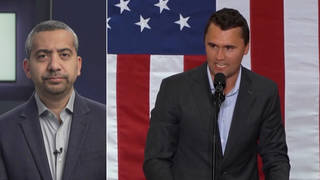
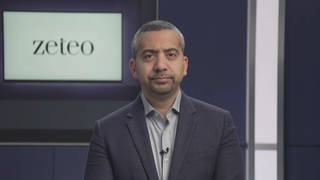
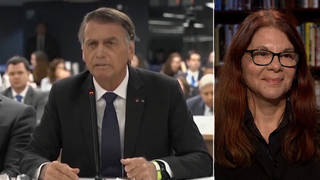






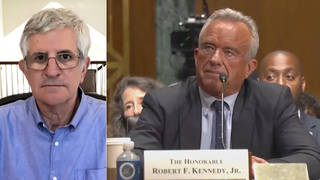
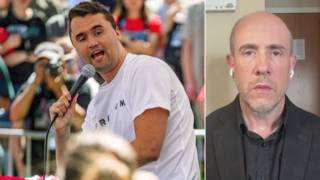
Media Options